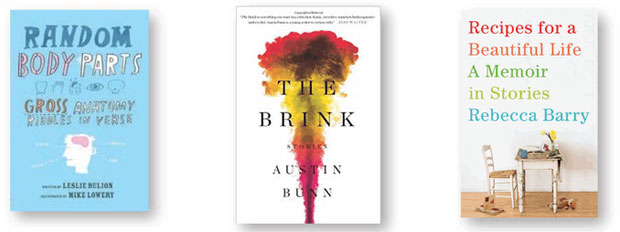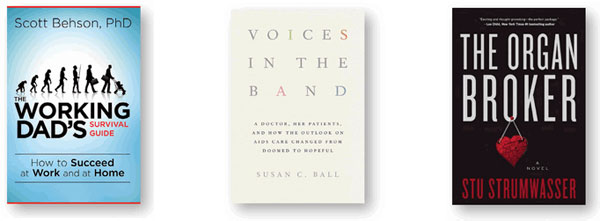This is just one article from CAM’s Summer Reading Special! Click the link to read the entire section.
There are many writers among Cornell alumni and faculty—and they’re a prolific bunch. Here’s a sampling of ten of their latest books, hot off the presses, in genres from memoir to thriller to whimsical verse.

The Real Doctor Will See You Shortly
Matt McCarthy
(Crown)
In a memoir subtitled “A Physician’s First Year,” an assistant professor at the Medical college takes readers through the intense days and nights of his internship at a New York City hospital. “People enter medical school with the belief that they’re on the path to becoming revered, trustworthy physicians,” McCarthy writes after his training gets off to a rough start, “but what if I was destined to become the one colleagues whispered about?” The young doctor’s intern year offers dramatic highs and lows, and McCarthy is forced to face his own mortality when a needle stick puts him at risk of HIV, prompting anxious weeks of waiting for test results. USA Today called the book “an entertaining window into an unknown world for most readers.” A previous work—the controversial Odd Man Out, about McCarthy’s brief tenure as a minor league baseball player—was a New York Times bestseller.
Off the Radar
Cyrus Copeland, MBA ’90
(Blue Rider)
The son of an Iranian mother and an American father, Copeland had a front-row seat to the Iranian revolution when the family was living there in the late Seventies. When his father was arrested and accused of working for the CIA—and no Iranian lawyer would take the case—it fell to Copeland’s mother to defend her husband, using her knowledge of Sharia law in a desperate attempt to save him from execution. Decades later, Copeland set out to answer a question that had long dogged him: had his dad really just been a businessman, or was he indeed a spy? Copeland’s quest forms the basis of his memoir. “I could imagine him doing some things on behalf of the United States, things possibly in the interest of America’s national security,” writes Copeland, a former ad executive. “But I never thought of him as a full-time CIA agent. And yet . . . he fit the profile, didn’t he?”
Guns Across America
Robert J. Spitzer, PhD ’80
(Oxford University)
Contrary to the popular belief about a historically unfettered right to bear arms, argues a political science professor at SUNY Cortland, eighteenth-century America put numerous restrictions and conditions on gun ownership. In a general-audience book subtitled “Reconciling Gun Rules and Rights,” Spitzer delves into such issues as stand-your-ground laws, the lethality of various weapons, and the relationship between gun legislation and the Second Amendment. Along the way he discusses several high-profile cases including the death of unarmed teen Trayvon Martin; the Colorado movie theater massacre; the mass killing of schoolchildren in Newtown, Connecticut; and the attempted assassination of Arizona Rep. Gabby Giffords, MRP ’97. As part of his research, Spitzer built a legal AR-15 assault weapon and went through the permitting and training process to carry a concealed handgun in New York State.
God Help the Child
Toni Morrison, MA ’55
(Knopf)
The latest novel by the Nobel Prize-winning author of Beloved explores the lasting power of childhood hurts, in what the New York Times called “a ballad about love lost and perhaps found, a ballad about fractured families and second chances.” Its protagonist, dubbed Bride, is a beauty whose blue-black skin caused her to be rejected by her light-skinned mother. Bride falls in love with—and has her heart broken by—a man coping with the legacy of his own childhood horror, the murder of his beloved older brother by a pedophile. “I’m scared,” Morrison writes, in Bride’s voice. “Something bad is happening to me. I feel like I’m melting away. I can’t explain it to you but I do know when it started. It began after he said, ‘You not the woman I want.’ ”

Random Body Parts
Leslie Bulion ’79
(Peachtree)
In a collection of “gross anatomy riddles in verse” for elementary-aged kids, Bulion’s light-hearted doggerel on human biology is paired with whimsical illustrations by Mike Lowery. As she writes in a poem on the nose: “Oh odors in the air are roaming / You’ll breathe them in; through me they’re coming / Reminding you of bygone days / But pollen wafts and air is dusty / So I make gobs of mucus disgusty / One ripe KERCHOO! And out it sprays.” Each poem comes with additional text explaining biological basics, and there’s a glossary of anatomical terms. School Library Journal praised the volume as “an engaging collection, equal parts gross-out humor and hard science.”
The Brink
Austin Bunn
(HarperCollins)
An assistant professor of performing and media arts offers a collection of ten short stories that Booklist called “a shimmering debut.” The tales—which explore characters in extremis—encompass a wide variety of settings, from a summer school class about the prospect of nuclear holocaust to a terrorist bomb that threatens a couple’s honey-moon to an epistolary description of a comet-worshipping cult. As the title implies, all have the common theme of people being brought to their limits—be they mental, physical, or emotional. “Seeing his father cry is like watching a building collapse when someone you know is inside,” Bunn writes of one teenage protagonist. “It is raw and close and terrifying.”
Recipes for a Beautiful Life
Rebecca Barry ’90
(Simon & Schuster)
Part memoir, part recipe collection, Barry’s book chronicles her family’s move to Upstate New York, where she and her husband and young sons settled in Trumansburg, a village outside Ithaca. She intersperses tales of domestic life and professional tribulations with recipes for comfort food like carrot-ginger soup, ethnic fare such as vegetable biryani, and even adult beverages (including margaritas and a whisky-based concoction called Angry Mommy Tea). Her chapters, each opening with “How to . . .,” offer solutions to such challenges as losing baby weight, silencing your inner critic, and getting your kids to go to bed.

The Working Dad’s Survival Guide
Scott Behson ’94
(Motivational)
Timed for release around Father’s Day, this business how-to book offers tips from an expert on work-family balance. Behson, the married dad of a ten-year-old boy and author of the “Fathers, Work, and Family” blog, gives practical advice on such issues as protecting family activities from the creeping demands of work, carving out “me time” for exercise and social activities, negotiating flexible work arrangements, and building a support network of peers. “It’s time that our most important life challenge—success in both our careers and in our families—is finally recognized as an important issue,” he writes. “It’s time that we, as fathers, start discussing our struggles.” A professor of management at Fairleigh Dickinson University, Behson has appeared on NPR, MSNBC, CBS, and other media outlets, and was a featured speaker at the White House Summit on Working Families.
Voices in the Band
Susan C. Ball
(Cornell University)
“I am an AIDS doctor,” Ball writes in the introduction to her medical memoir, a narrative nonfiction look at the HIV epidemic. An associate professor at the Medical college, Ball has worked at the AIDS clinic at NewYork-Presbyterian, Cornell’s teaching hospital, since in the early Nineties—before the advent of drugs that made it a manageable disease. Her book is distinct in examining the AIDS crisis from the perspective of the patient experience, as she chronicles the people she calls “a combination of brave, depraved, strong, entitled, admirable, self-centered, amazing, strange, funny, daring, gifted, exasperating, wonderful, and sad.” A physician-reviewer in the New York Times noted that the memoir, “brought the bad old days back to me in Technicolor: the waiting rooms full of walking skeletons, splotched and coughing, vanishing forever at regular intervals. Those were the days when you returned to work after a week’s vacation and asked, ‘Who died?’ ”
The Organ Broker
Stu Strumwasser ’88, BS ’89
(Arcade)
In his first novel, which Publishers Weekly called “a real eye-opener,” Strumwasser explores the shadowy world of black market organ trafficking. His protagonist—the broker of the title—is one New York Jack, a longtime seller of kidneys and other organs to the wealthy and desperate. Faced with the choice between participating in a murder and losing a $2 million commission, he suffers a crisis of conscience that sends him on an international adventure, fleeing his enemies and the authorities. Told in first person, the novel is crafted as Jack’s confession. “Most of the business takes place overseas,” he says in the opener, “so the industry has come to be known as ‘Transplant Tourism’—and I’m the cruise director.”


